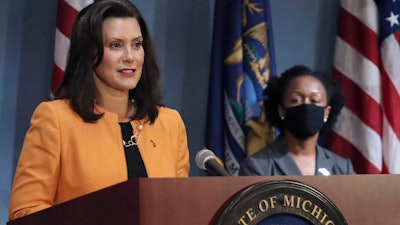
TRAVERSE CITY, Mich. (AP) — Gov. Gretchen Whitmer on Wednesday called for Michigan to become “carbon neutral” by 2050 in the fight against climate change, which would require steep reductions in greenhouse gas emissions and significantly greater use of renewable energy.
The Democratic governor issued a directive pledging “comprehensive and aggressive” efforts but provided few details on how the goal would be achieved. A separate order established a council of government officials and citizens to develop a strategy.
“The science is clear — climate change is directly impacting our public health, environment, our economy, and our families,” Whitmer said in a statement. Discussing her plan in a virtual event with other governors, she added: "There’s no time to waste when it comes to fighting climate change. We’ve got to act now.”
Michigan is the ninth state to pledge carbon neutrality, which theoretically would mean halting all carbon dioxide releases — a long-term achievement at best.
For now, such proposals generally seek a combination of emission reductions and stepped-up efficiency in industry and building construction as technology is refined to scrub carbon from the atmosphere and store it underground. Other measures can include planting trees and cover crops.
Carbon traps heat from the sun and has raised temperatures worldwide, contributing to extreme weather such as floods, heat waves, drought and hurricanes while also worsening wildfire outbreaks.
The Intergovernmental Panel for Climate Change has called for global carbon neutrality by mid-century, a target endorsed by European Commission last year. But the Trump administration's plan to withdraw the U.S. from the 2016 Paris Agreement has prompted some states and cities to adopt their own initiatives.
Whitmer set an interim goal of reducing Michigan’s emissions 28% below 1990 levels by 2025.
She also directed the state Department of the Treasury to craft a plan for helping communities maintain critical services and create new jobs as economy shifts from reliance on fossil fuels such as oil and gas to cleaner energy sources including solar and wind.
While the Trump administration has downplayed climate change and warned that efforts to curb it could harm the U.S. economy, some industry sectors have acknowledged the problem. Michigan's electric utilities are phasing out coal-fired power plants.
Several business organizations praised Whitmer's announcement, including the Michigan Chemistry Council, which represents chemical manufacturers.
“The business of chemistry plays a critical role in achieving a sustainable future by enabling innovations like solar panel materials, batteries for electric cars and lightweight vehicle parts," Executive Director John Dulmes said.
Whitmer instructed the Department of Technology, Management, and Budget to seek energy efficiency in new state buildings and facilities.
“This shows Michigan’s commitment to reducing our environmental impact and driving growth in the clean energy economy, including driving clean energy businesses like mine,” said Carla Walker Miller, CEO of a Detroit energy efficiency company.
Environmental and public health advocacy groups said the push for carbon neutrality would protect fragile ecosystems while reducing pollution that causes asthma and allergies.
“In the past few weeks, the skies over Michigan have been darkened by the smoke from fires burning 2,000 miles away," said Mary Brady-Enerson, Michigan director of Clean Water Action. “Severe storms have flooded communities across our state. We are hopeful that these orders are just the beginning of Michigan’s efforts to address climate change.”






















